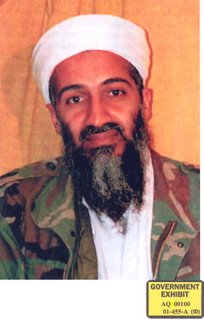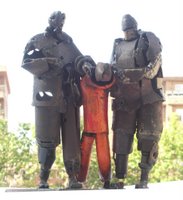 The American Legion still has a few WWII veterans in its ranks. The setting is perfect for the administration’s new selling points on the war in Iraq – we are no longer engaged in a war on terrorism but on a war on fascism. Whether or not some or all of these various terrorist groups are fascist or not is something this blog will discuss at a later time. However, Rumsfeld’s speech isn’t about the complexities of political ideology – it’s about painting the world in black and white terms faced with either or scenarios. It’s not merely fascism but Hitler. It’s not 2006 but 1939.
The American Legion still has a few WWII veterans in its ranks. The setting is perfect for the administration’s new selling points on the war in Iraq – we are no longer engaged in a war on terrorism but on a war on fascism. Whether or not some or all of these various terrorist groups are fascist or not is something this blog will discuss at a later time. However, Rumsfeld’s speech isn’t about the complexities of political ideology – it’s about painting the world in black and white terms faced with either or scenarios. It’s not merely fascism but Hitler. It’s not 2006 but 1939.President Bush speaks before the American Legion convention in Salt Lake City today and is expected to urge the country to “stay the course.” Donald Rumsfeld spoke earlier this week. As Fred Kaplan explains, Rumsfeld’s main points were, “Today's terrorists pose the same threat as yesteryear's Nazis; critics of the war in Iraq are like the appeasers before World War II; the real problem is that ‘the media’ spreads ‘lies’ and ‘myths’ about how the war is going.”
This is Fred Kaplan’s take in Slate,
… Rumsfeld posed four questions. "These are central questions of our time, and we must face them," he said. So, let's face them.
1. "With the growing lethality and availability of weapons, can we truly afford to believe that somehow vicious extremists can be appeased?"
Well, it depends which "vicious extremists" he's talking about. If he's talking about the leaders of al-Qaida, no, probably not. But, even here, it's a mistake to presume that there are only two choices—appeasement or war. Sometimes, war, at least war fought in a certain style, does as much harm as good.
2. "Can we really continue to think that free countries can negotiate a separate peace with terrorists?"
Again, it depends what he means by "terrorists." If he's talking about al-Qaida, who is advocating such a thing? If he's talking about, say, Syria or Iran, which are state sponsors of terrorism, it's sheer folly not to negotiate with them, at least on some issues. (Rumsfeld loads the deck by tossing in the phrase "a separate peace.") Several notable (and quite hawkish) Israelis, including a former director of Mossad, have advocated negotiating with Syria over its support of Hezbollah. Many Americans, of both parties and all persuasions, have urged George W. Bush to negotiate with Iran over its nuclear program. It's worth recalling that, shortly after 9/11, the Bush administration quietly opened up a line of diplomacy and cooperation with Iran over its shared interest in toppling the Taliban regime of Afghanistan.
Rumsfeld properly lionizes Winston Churchill and, implicitly, Franklin D. Roosevelt for recognizing the threat from Nazi Germany at a time when many dismissed his warnings. But it's a good thing that the Western leaders of World War II weren't as dogmatic as their wannabe-emulators of today. Otherwise, they might not have formed an alliance with the Soviet Union (out of a refusal to negotiate with evil Communists), and they might have therefore lost the war.
3. "Can we truly afford the luxury of pretending that the threats today are simply 'law-enforcement' problems, rather than fundamentally different threats, requiring fundamentally different approaches?"
Once more, Rumsfeld loads the deck. Nobody claims that today's threats are "simply" matters of law enforcement. Obviously, terrorists are not "simply" criminals, and dealing with them requires a mix of approaches, including military. That said, techniques of law enforcement (including police surveillance, border patrol, and international intelligence sharing) have recently broken up more terrorist plots than any military operation.
4. "And can we truly afford to return to the destructive view that America—not the enemy—is the real source of the world's trouble?"
This is another red herring. Few Americans, and virtually no contenders in American politics, hold this view. However, a lot of people in other countries—including countries that are, or should be, our allies—do hold this view. Look at the Pew Research Center's most recent"global attidudes survey," released this past June. In only four of the 15 nations surveyed (Britain, India, Japan, and Nigeria) did a majority of citizens have a favorable view of the United States. In six countries (Spain, Indonesia, Turkey, Pakistan, Egypt, and Jordan), Iran had a higher rating than did the United States. (In one more, Russia, the two countries' ratings were tied.) Most remarkable, in all but one country (Germany), America's presence in Iraq was seen as a bigger danger to world peace than either Iran or North Korea.
These views are widespread—and, by the way, they've grown steadily more prominent in the past few years—not because of "the media" or "blame-America-first" liberals, nor because Iran and North Korea have more skillful propagandists (or, if they do, it's time for Condoleezza Rice to hire a better public-diplomacy staff). No, a country's global image is usually formed not by what its leaders say but rather by what they do.
Rumsfeld should ponder another set of questions that he posed to a handful of top advisers back in October 2003, in a private memo (which was leaked shortly afterward to USA Today):
Today, we lack metrics to know if we are winning or losing the global war on terror. Are we capturing, killing or deterring and dissuading more terrorists every day than the madrassas and the radical clerics are recruiting, training and deploying against us?
Does the US need to fashion a broad, integrated plan to stop the next generation of terrorists? The US is putting relatively little effort into a long-range plan, but we are putting a great deal of effort into trying to stop the terrorists. The cost-benefit ratio is against us! Our cost is billions against the terrorists' costs of millions.
How do we stop those who are financing the radical madrassa schools? Is our current situation such that "the harder we work, the behinder we get"? ... Should we create a private foundation to entice radical madrassas to a more moderate course?All excellent questions. At the time, I called the memo "pathetic" because Rumsfeld had taken so long to formulate its points. In retrospect, I was too cruel. What's really pathetic is that nearly three years have since passed and the Bush administration still hasn't answered his questions. And what's truly cynical is that Rumsfeld can deliver such a simpleminded speech—charging the critics of the war in Iraq with historical ignorance and "moral confusion"—when he knows the truth is more complicated.














